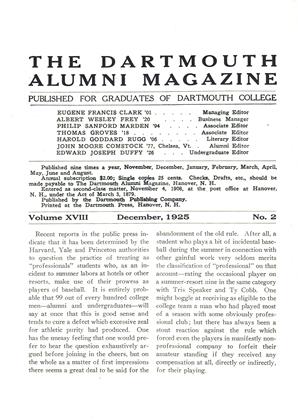Dartmouth's great football team concluded its season in Chicago by defeating the strong University of Chicago eleven by a score of 33 to 7 at Stagg Field, November 14. For years the Dartmouth alumni of the Middle West have looked forward to seeing a Green team playing within their territory, and this season saw there what was probably the finest team in the history of the College demonstrate its superiority over one of the strong Conference teams.
The Chicago team, primarily noted as a great defensive organization played against Dartmouth its best game of the year and one which according to its supporters and to Chicago sport writers would have defeated any other team Chicago had met during the season. Nevertheless the Dartmouth team yielded but one touchdown to the crushing attack of Stagg's men and piled up against the Maroons a score larger than the total of the scores made by Chicago's previous opponents. It was the unanimous opinion of the Dartmouth players as well as of those who had seen the Green's earlier games that Chicago was far stronger than Harvard, Brown, or Cornell. Likewise is is agreed that Dartmouth, quite naturally, did not display in this final game the form shown in the game with Cornell. But the victory was none the less decisive.
Dartmouth early found that the Chicago defense against a rushing attack was of the stone wall variety and that any large gains could only come as the result of forward passing. The Hanover team discovered also that Chicago would be hard to hold in check. At the end positions the Maroons possessed such an advantage in weight that the Dartmouth flanks were constantly threatened, and although Stagg's men had not shown any end runs prior to this contest they made most of their gains against the Green by this attack. Kernwein, a fast halfback, repeatedly made wide gaining sweeps around the Dartmouth left end. Aided by the famous "Five Yards McCarthy" who lived up to his name in ripping through the Green line, Chicago early in the game advanced to within scoring position. But the Dartmouth defense rallying as Chicago neared the goal line withstood the attack and took the ball on downs. On a fake punt McPhail slipped through the line for a long dash and relieved a situation which had become tense. Shortly afterwards a pass from Oberlander to Tully scored the first points for Dartmouth.
In much the same fashion the game progressed through the succeeding periods. Time and again the Chicago team pressed deep into Dartmouth territory. Almost always the Dartmouth team repulsed the attack and relied upon superior kicking ability to force the Maroons back again. Three times when Chicago was within the Dartmouth 25-yard line the Green team took the ball on downs. When on the offensive Dartmouth placed great reliance in its superior passing ability. Four marches, of 72, 80, 84, and 45 yards, mostly gained as the result of passes from Oberlander to Tully, Sage, or Lane, resulted in touchdowns. The remaining touchdown, the second scored by Dartmouth, came when Captain Parker racing down the field under an Oberlander punt scooped up the ball after it had struck a Maroon player and carried it to the Chicago goal line.
Chicago scored in the third period after a penalty which took the ball from Dartmouth on the Green's 15-yard line. On a fourth down, while Oberlander was punting, holding was detected in the Dartmouth line. The new rule which provides that in case of holding while the ball is in the air the ball goes to the offended team at the point where the offense was committed gave the Stagg men their brightest scoring chance. They were not. slow to take advantage of it. Kernwein in two attempts covered the intervening yards and gave Chicago rooters the opportunity to release their marOort balloons.
In addition to Kernwein and McCarthy the Chicago team showed several other men of marked ability who troubled Dartmouth all afternoon. These were Lampe and Yiesley at the ends, and Captain Henderson, at left tackle. For Dartmouth, Oberlander, in spite of being a marked man, as usual proved his pre-eminence. Holleran at left tackle was the target for a great part of the Chicago offense and stood up well under the battering attack. Captain Parker, who opposed Henderson, also played a spectacular game, and McPhail, in addition to showing again his astuteness as a quarterback, made several long gains.
The New Captain Newman M. Horton '27
 View Full Issue
View Full Issue
More From This Issue
-
 Article
ArticleSHORT PAGES FROM ONE LONG LIFE
December 1925 By Roy Brackett -
 Article
ArticlePROBLEMS IN EDUCATION AT DARTMOUTH COLLEGE
December 1925 -
 Article
ArticleSCRAPS OF PAPER
December 1925 By Professor Edwin J. Bartlett '72 -
 Article
ArticleRecent Reports in the Public Press
December 1925 -
 Article
ArticleALUMNI ASSOCIATIONS
December 1925 -
 Article
ArticleFROM THE UNDERGRADUATE CHAIR
December 1925
Sports
-
 Sports
SportsCULLEN AND FRIEDMAN EARN PLACES ON MYTHICAL FIVES
May, 1923 -
 Sports
SportsGymnasium
August, 1926 -
 Sports
SportsDirect Destinies of 1942 Indians
October 1942 -
 Sports
SportsSwimming Lessons
Nov/Dec 2007 By Carolyn Kylstra ’08 -
 Sports
SportsGolf
May 1953 By Cliff Jordan '45 -
 Sports
SportsNOTRE DAME 64, DARTMOUTH 0
November 1944 By Francis E. Merrill '26


